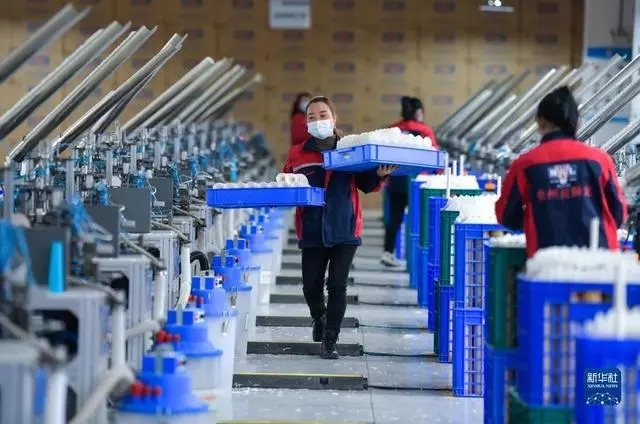China's economy regains vitality after going through most difficult period

Workers work inside a badminton shuttlecock production base of Guizhou RSL Sports Culture Development Co., Ltd. in southwest China's Guizhou Province. [Photo/Xinhua News Agency]
In 2023, more favorable factors will emerge to support China's economic growth, and the Chinese economy is expected to show an overall improvement, Yin Yanlin, deputy director of the General Office of the Central Financial and Economic Affairs Commission, said at the China Wealth Management 50 Forum on Dec. 24, 2022.
The COVID-19 pandemic is currently an uncertainty affecting China's economic operations and the country has gone through the most difficult period, Yin mentioned.
With the implementation of the optimized epidemic control measures, the flow of people and logistics operations will become smoother, economic and social activities are expected to recover at an accelerated pace and the vitality of the economy will be effectively unleashed, Yin noted.
The blow dealt by the COVID-19 pandemic to the Chinese economy has been severe. In November 2022, retail sales of consumer goods were down 5.9 percent year-on-year and trade in goods increased by only 0.1 percent compared with the same period last year. Meanwhile, the surveyed urban unemployment rate increased to 5.7 percent, 0.2 percentage points higher than one month earlier.
Nonetheless, we should also remember that the fundamentals of China's economic growth have not changed, and the fact that China has a big market and enormous development potential and that new driving forces continue to emerge will remain unchanged for a very long time. China has optimized its epidemic control measures for better coordination between epidemic control and economic and social development, creating important conditions for economic recovery.
Statistics indicated that despite the impact of the epidemic, China's hi-tech industry has picked up steam. Between January and November 2022, investment in this industry increased by 19.9 percent, 14.6 percentage points higher than the overall investment.
The rapid growth of the hi-tech industry is conducive to optimizing the supply structure and facilitating industrial upgrading. Meanwhile, the online retail market has continued to grow and online shopping has driven other industries, including the express delivery sector, to achieve rapid growth. Online shopping and online services have spurred the growth of information services. These all reflect the strong resilience of the Chinese economy.

Purchasing agents learn about exhibits displayed at the 13th China-UAE Trade Expo on Dec. 20, 2022 in Dubai, the United Arab Emirates (UAE). [Photo/Xinhua News Agency]
The Central Economic Work Conference held earlier this month demanded that economic stability be made a top priority and that steady progress be pursued while ensuring economic stability for the next year. The meeting also announced fiscal, monetary, industrial, science and technology and social policies, and also called for better coordination of epidemic prevention and control with economic and social development.
China has more than 400 million middle-income earners, who are a major force for consumption expansion.
Investment serves as an important driving force for economic development. As of the end of November 2022, the National Development and Reform Commission (NDRC) had approved 106 key projects worth around 1.5 trillion yuan ($220 billion), while throughout 2021, the NDRC approved 90 key projects with a total value of 775.4 billion yuan.
In the first 11 months of 2022, foreign direct investment (FDI) into the Chinese mainland, in terms of actual use, expanded by 9.9 percent year on year, indicating foreign investors' growing confidence in China's development.
The country announced a slew of policies and measures to increase the amount, stabilize the stock and improve the quality of foreign investment. The implementation of these measures will inject greater energy into China's economic growth in 2023.
Considering that COVID is easy to rebound, how to better coordinate epidemic control and economic development is still a top priority for now.
We should also clearly realize that China's economy is facing the triple pressures of shrinking demand, disrupted supply and weakening expectations, and it will take some time for investment, consumption and exports to recover.
To deal with this, it is necessary to further stimulate investment, especially to boost market expectations for social investment while tapping the consumption potential by increasing residents' incomes, issuing consumption coupons, and improving income distribution. In terms of foreign trade, further efforts should be made to improve the business environment and expand channels for foreign trade.
Many foreign institutions and organizations have raised their latest forecasts for China's economic growth for 2023. As China has continuously optimized its epidemic control measures, the biggest uncertainty affecting China's economic growth will eventually be properly dealt with and various policies will gradually take effect. It is highly likely that the resilient Chinese economy looks set to embrace a strong recovery.
The author is a researcher with Beijing Open Economy Research Insittute of the University of Internatinal Business and Economics.
The views don't necessarily reflect those of Qiushi Journal.
























